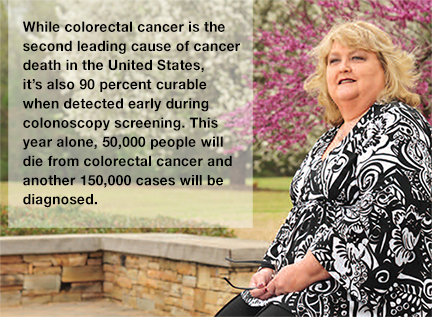Patient Stories
Colonoscopy is Key in Early Detection of Colon Cancer
Colorectal cancer almost always develops from pre-cancerous polyps or abnormal growths, in the colon or rectum. A colonoscopy detects polyps so they can be removed before they become cancerous through a chain of events that occurs over a 10 to 15 year period.
Colonoscopy screenings should be started at age 45, with additional screenings every 10 years. Individuals with a parent, sibling or child diagnosed with colorectal cancer should start at age 40 and have screenings every five years. In addition, because some studies have shown African Americans tend to be diagnosed at an earlier age, they are advised to have their first colonoscopy at age 45.
 Colonoscopies are best performed by gastroenterologists and surgeons who are fellowship trained in the specialty. “Those with gastroenterology training, regardless of their sub-specialty, are going to have the best rates for detection of polyps and fewer complications,” said Dr. Knepp.
Colonoscopies are best performed by gastroenterologists and surgeons who are fellowship trained in the specialty. “Those with gastroenterology training, regardless of their sub-specialty, are going to have the best rates for detection of polyps and fewer complications,” said Dr. Knepp.
In addition, a gastroenterology practice offers patients a continuum of care should polyps or other gastro issues be detected during screening.
At age 56, Cheryl Miller had yet to receive a colonoscopy screening. When she experienced some rectal bleeding, she didn’t see a doctor right away because of time restrictions as her mother’s caregiver.
Eventually, she couldn’t ignore her symptoms anymore and sought medical treatment. Her colonoscopy detected cancer, which could have been found during an earlier screening and treated while still in a pre-cancerous stage. She had no family history of colon cancer.
“He knew right away,” the Warwick resident said of Dr. Knepp’s diagnosis during her colonoscopy. “The minute he saw it, he went out and told my daughter.”
Things moved quickly for Ms. Miller. Under the care of Thomas Neal, MD, an oncologist at Phoebe Cancer Center, she underwent a round of chemotherapy and radiation, followed by surgery and another round of chemotherapy. Five years later, she is cancer free, but will have to use a colostomy bag for the rest of her life. She doesn’t want to see others go through what she has experienced, especially when there’s a proven method for early detection so readily available.
“I would advise everyone to get a screening early,” Miller said. “Maybe if I had done so sooner, they would have caught it before it became cancer.”
To schedule a colonoscopy screening or to learn more, call 229-312-0698.